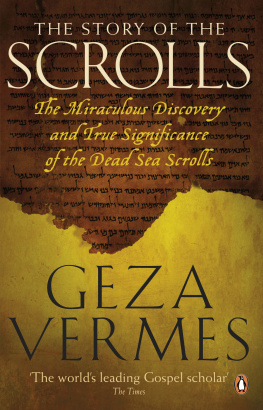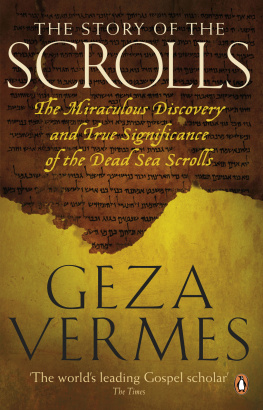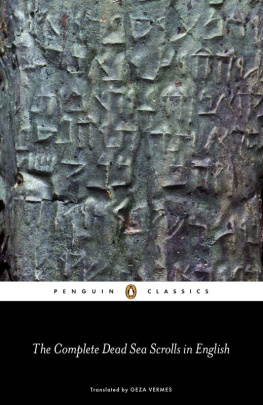Geza Vermes - Jesus the Jew
Here you can read online Geza Vermes - Jesus the Jew full text of the book (entire story) in english for free. Download pdf and epub, get meaning, cover and reviews about this ebook. publisher: SCM Press, genre: Religion. Description of the work, (preface) as well as reviews are available. Best literature library LitArk.com created for fans of good reading and offers a wide selection of genres:
Romance novel
Science fiction
Adventure
Detective
Science
History
Home and family
Prose
Art
Politics
Computer
Non-fiction
Religion
Business
Children
Humor
Choose a favorite category and find really read worthwhile books. Enjoy immersion in the world of imagination, feel the emotions of the characters or learn something new for yourself, make an fascinating discovery.
- Book:Jesus the Jew
- Author:
- Publisher:SCM Press
- Genre:
- Rating:3 / 5
- Favourites:Add to favourites
- Your mark:
- 60
- 1
- 2
- 3
- 4
- 5
Jesus the Jew: summary, description and annotation
We offer to read an annotation, description, summary or preface (depends on what the author of the book "Jesus the Jew" wrote himself). If you haven't found the necessary information about the book — write in the comments, we will try to find it.
Jesus the Jew — read online for free the complete book (whole text) full work
Below is the text of the book, divided by pages. System saving the place of the last page read, allows you to conveniently read the book "Jesus the Jew" online for free, without having to search again every time where you left off. Put a bookmark, and you can go to the page where you finished reading at any time.
Font size:
Interval:
Bookmark:


These pages are dedicated to the memory of a friend, the leading Jewish New Testament scholar of his generation, whose outstanding achievement in the field of Gospel research is justly celebrated, and whose death on 9 October 1969 created a large gap in the world of learning and left a perceptible emptiness in the lives of the few who loved him.
PAUL WINTER
19041969
IN PIAM MEMORIAM
Geza Vermes, 1973, 1983, 1994
Preface Stefan C. Reif 2001
All rights reserved. No part of this publication may be reproduced, stored in a retrieval system, or transmitted, in any form or by any means, electronic, mechanical, photocopying or otherwise, without the prior permission of the publisher, SCM Press.
0 334 02839 6
First published in 1973 by
William Collins Sons & Co.
Second edition published 1983 by
SCM Press Ltd
This edition first published 2001 by
SCM Press
917 St Albans Place, London N1 0NX
Second impression 2006
Typeset by Rowland Phototypesetting Ltd,
Bury St Edmunds, Suffolk
Printed and bound in Great Britain by
Bookmarque Ltd, Croydon, Surrey
Preface
A thousand years ago, the image that people had of Jesus of Nazareth was not the result of a complex challenge to their knowledge, intellect and faith but depended to a great extent on whether they were Christians or Jews. For the former, Jesus was the Son of God, born of the Virgin Mary, who was sent into the world to preach his message and to suffer crucifixion and who was resurrected on the third day after his death and then reunited with God at his right hand. For the latter, Jesus was born as a result of his mothers illicit relations, was a brilliant student who rebelled against his teachers and used the power of the divine name to perform sorcery, for which activities he was put to death. The precise Christian theology might vary from sect to sect and the Jewish folklore could take on different forms but the essential point of controversy remained the same, namely, whether Jesus was human or divine.
Once the seeds of modern thinking had been planted among Christians and had sprouted Protestant interpretations and humanist viewpoints, the intellectual blossoms took on a different hue. As Isabel Rivers has pointed out in the first volume of her Reason, Grace and Sentiment (Cambridge: Cambridge University Press 1991 p. 83), Edward Fowler, Bishop of Gloucester, could, in his The Design of Christianity of the 1670s, describe Jesus as the most balanced, charming and attractive of men, nothing short of a model Anglican gentleman. As the episcopal view put it,
he was a Person of the Greatest Freedom, Affability and Courtesie, there was nothing in his Conversation that was at all Austere, Crabbed or Unpleasant. Though he was always serious, yet he was never sowr, sullenly Grave, Morose or Cynical; but of a marvellously conversable, sociable and benign temper.
For the German orientalist, Hermann Samuel Reimarus, who died in 1768, Jesus was a Jewish political leader who attempted to rid his country of the Roman occupation and marched into Jerusalem in the hope of being proclaimed the newly anointed leader (Hebrew: mashia; English: messiah). He was put to death for his efforts, and his supporters stole and hid his body. They then explained their heros reverse of fortune by promoting the idea of his resurrection and a more theological notion of his messianic activity.
One of the results of the liberation of Christians from their theological confines was, of course, the emancipation of the Jews from the narrowness of their ghettos. As a consequence of this greater freedom, intellectual Jews of the early nineteenth century in central and western Europe sought to replace their folkloristic view of Jesus with one that could occupy a more convincing place in the new Jewish history that they were composing. Both Christians and Jews were therefore at that time enthusiastically uncovering layers of legend, literature and theology as they searched for the historical Jesus that might lie at the core of their traditions. What they found in the course of the nineteenth and twentieth centuries was not one modern figure to replace their medieval notions but a rich kaleidoscope of differing images. Jesus had been an inspired teacher whose religious life had been simple but sublime; or an ascetic who had rejected the community and the present in favour of the individual and the future; or a popular hero whose humanity deserved the greatest adulation. For some scholars, he was a humble Pharisee who told superb parables and subscribed to a brilliant code of ethics while for others he was a Galilean revolutionary zealot, or an Essene who favoured poverty, esotericism and celibacy. He was even made to take on the guise of a modern Reform Rabbi.
But, as is well recognized by contemporary historians, it is virtually impossible to remove all traces of personal bias and tendentious interpretation from the treatment of such a sensitive subject. Inevitably, the majority of modern Jewish scholars continued with their tendency to dwell on the human aspect of Jesus while many of their Christian counterparts persisted in stressing his theologically unique character. While the former made efforts to reclaim Jesus for the Jews, the latter preferred to draw a distinction between Jesus of Nazareth and the Divine Christ of their religious commitment. It thus became almost commonplace for leading Protestant academics to disclaim the possibility of recovering any authentic details about the life of the founder of their faith and to characterize the personal information provided in the Gospels as nothing more than religious myths. What remained important and authentic were the Jesus of faith, the divine revelation represented by the New Testament, and the teachings of the Church. Paradoxically, those Christians who still sought to identify the real Jesus who lived and taught in Roman-occupied Judea looked progressively more towards Jewish scholars who could reconstruct that world for them, particularly if such specialists could be seen to be untrammelled by commitments to more traditional forms of Jewish belief and practice. No less paradoxically, these Jewish specialists themselves could respond to the challenge of Jesus religious message and devise for themselves, and indeed for any progressive interpretations of Judaism that required it, a sympathetic response that they could justify on what they saw as historical grounds.
It is against the whole academic and religious background just described that one has to understand historical books about Jesus written in recent decades, one of the most prominent of which has undoubtedly been Jesus the Jew, first published by Geza Vermes in 1973. Vermes had been born in Mako, Hungary, between the two World Wars into an assimilated Jewish family that decided to convert to Catholicism when he was seven years old. According to his own account in an autobiography entitled Providential Accidents (London: SCM Press 1998), the motivation for this, at least on his fathers part, was an attempt (sadly unsuccessful) to spare the family the disabilities and the persecution to which Jews were at that time prone. Bright and industrious as he was, the young Geza successfully progressed through a thorough Catholic education and, almost inevitably, found himself in the priesthood. As his autobiography tragically and poignantly makes clear, his status in the Roman Catholic Church did not save his family from the Holocaust and he himself barely escaped with his life. After the War, he studied and researched in the fields of Hebrew and Aramaic in Louvain and Paris and was among the first to apply his learning to the decipherment and interpretation of the newly discovered Dead Sea Scrolls. Having left the priesthood, he abandoned Catholicism, married and reverted to his Jewish roots. He enjoyed a successful tenure as lecturer in divinity in the University of Newcastle from 1957 until 1965, when he was appointed Reader in, and subsequently Professor of, Jewish Studies in the University of Oxford.
Next pageFont size:
Interval:
Bookmark:
Similar books «Jesus the Jew»
Look at similar books to Jesus the Jew. We have selected literature similar in name and meaning in the hope of providing readers with more options to find new, interesting, not yet read works.
Discussion, reviews of the book Jesus the Jew and just readers' own opinions. Leave your comments, write what you think about the work, its meaning or the main characters. Specify what exactly you liked and what you didn't like, and why you think so.









